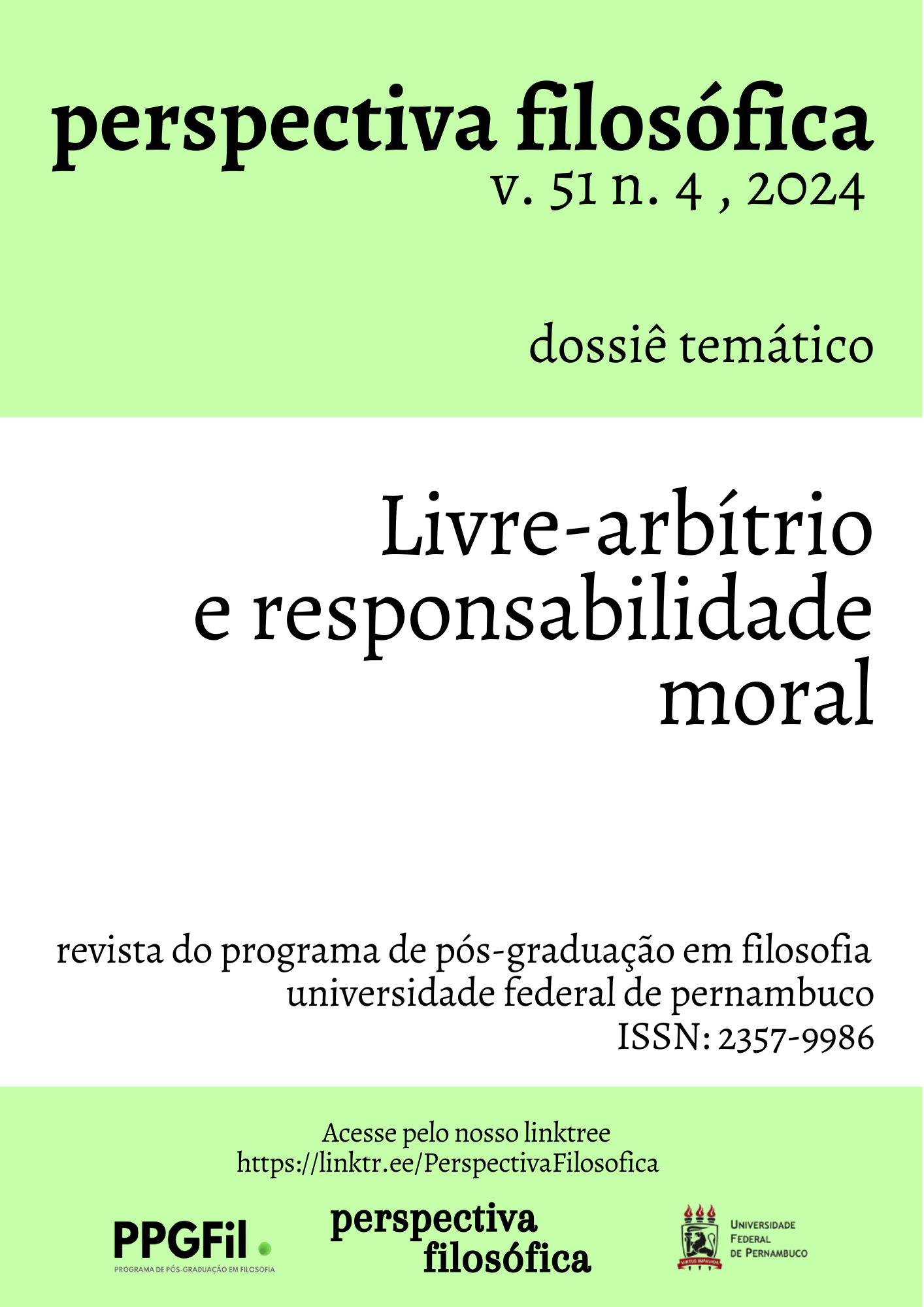O Problema do Livre-Arbítrio e a (Im)Possibilidade do Progresso Filosófico
DOI:
https://doi.org/10.51359/2357-9986.2024.259873Palabras clave:
John Searle, Daniel Dennett, livre-arbítrio, progresso em filosofia, compatibilismoResumen
O objetivo deste artigo é analisar a afirmação de John Searle de que o problema tradicional do livre-arbítrio é um escândalo filosófico porque não demonstra progresso relevante. A distinção de Wilfrid Sellars entre imagem manifesta e imagem científica do ser humano é apresentada para contextualizar o problema filosófico tradicional do livre-arbítrio. A possibilidade do progresso na filosofia é brevemente discutida para avaliar se o problema do livre-arbítrio se encontra em desvantagem em relação a outros problemas filosóficos. Por fim, o compatibilismo de Daniel Dennett é proposto como resposta a Searle. O livre-arbítrio compreendido pela perspectiva evolucionista de Dennett representa um tipo de progresso no esforço filosófico para conciliar a imagem manifesta e a imagem científica.
Citas
CHALMERS, David. “Why isn’t there more progress in philosophy?” In KELLER, John A. Beinf, Freedom and Method: themes from philosophy of Peter van Inwagen. New York: Oxford University Press, 2017, p. 277-298.
DENNETT, Daniel C. Elbow Room: The varieties of free will worth wanting. Cambridge, Mass.: MIT Press, 1984.
DENNETT, Daniel C. Conciousness Explained. Nova York, Boston e Londres: Little, Brown & Co., 1991.
DENNETT, Daniel C. Freedom Evolves. Nova York: Penguin, 2004 [2003].
DIETRICH, Eric. “There is no progress in philosophy.” Essays in Philosophy, v. 12, n. 2, 2011, p. 329–344.
DILMAN, Ilham. Free Will: An historical and philosophical introduction. London: Routledge, 1999.
DUTRA, Luiz H. de A. “A liberdade é um fato natural ou uma construção social?” Principia, Florianópolis, v. 4, n. 2, 2000, p. 305-316.
DUTRA, Luiz H. de A. “Consciência e liberdade.” Veritas, Porto Alegre, v. 64, n. 2, 2019, p. 1-38.
ELTON, Matthew. Daniel Dennett: Reconciling science and our self-conception. Cambridge: Polity Press, 2003.
GERBER, William. “Is there progress in Philosophy?” Journal of the History of Ideas, v. 34, n. 4, 1973, p. 669–673. Disponível em: . Acesso em: 13 Mar. 2021.
GREENE, Joshua & COHEN, Jonathan. “For the law, neuroscience changes nothing and everything.” Philosophical Transactions of the Royal Society of London B. 359, 2004, p. 1775–1785.
KANE, Robert. The Significance of Free Will. New York and Oxford: Oxford University Press, 1998 [1996].
KANT, Immanuel. The Cambridge Edition of the Works of Immanuel Kant. Correspondence. Translated by Arnulf Zweig. Cambridge Edition of the Works of Immanuel Kant. Cambridge: Cambridge University, 1999.
KUHN, Thomas S. The Structure of Scientific Revolutions. Third Edition. Chicago: The University of Chicago Press, 1996 [1970].
LAUDAN, Larry. Progress and its Problems: Towards a theory of scientific growth. California: The University of California Press, 1977.
LIBET, Benjamin. Neurophysiology of Consciousness: selected papers and new essays by Benjamin Libet. Birkhäuser Boston, 1993.
MOODY, Todd C. “Progress in Philosophy.” American Philosophical Quarterly, v. 23, n. 1, 1986, p. 35–46. Disponível em: . Acesso em: 14 Mar. 2021.
PRATA, Tárik de A. “É o naturalismo biológico uma concepção fisicalista?” Principia, Florianópolis, v. 16, n. 2, 2012, p. 255-276.
RESCHER, Nicholaus. Free Will: an extensive bibliography, Berlin, Boston: De Gruyter, 2010.
SEARLE, John R. Minds, Brains and Science. Thirteenth printing. Cambridge, Mass.: Harvard University Press, 2003 [1984].
SEARLE, John R. The Rediscovery of the Mind. Cambridge, Mass., e London: The MIT Press, 9th printing, 2002 [1992].
SEARLE, John R. “Consciousness, free action and the brain.” Journal of Consciousness Studies, 7, No. 10, 2000, p. 3-22.
SEARLE, John R. Freedom and Neurobiology: Reflections on free will, language, and political power. Columbia University Press, 2007.
SELLARS, Wilfrid. Science, Perception and Reality. Atascadero, CA: Ridgeview, 1991 [1963].
SLEZAK, Peter P. “Is There Progress in Philosophy? The Case for Taking History Seriously.” Philosophy, v. 93, n. 4, p. 529-555, 2018.
VAN INWAGEN, Peter. “Freedom to Break the Laws.” Midwest Studies in Philosophy, v. 28, n. 1, 2004, p. 334-350.
WOLF, Susan. Freedom Within Reason. New York and Oxford: Oxford University Press, 1993 [1990].
ZAWIDZKI, Tadeusz W. Dennett. Oneworld thinkers. Glasgow: Oxford, 2007.
Descargas
Publicado
Número
Sección
Licencia
Derechos de autor 2024 Thiagus Mateus Batista

Esta obra está bajo una licencia internacional Creative Commons Atribución 4.0.
A Revista Perspectiva Filosófica orienta seus procedimentos de gestão de artigos conforme as diretrizes básicas formuladas pelo Conselho Nacional de Desenvolvimento Científico e Tecnológico (CNPq). http://www.cnpq.br/web/guest/diretrizesAutores que publicam nesta revista concordam com os seguintes termos:
Os autores mantém os direitos autorais e concedem à revista o direito de primeira publicação, sendo o trabalho simultaneamente licenciado sob https://creativecommons.org/licenses/by/4.0/deed.pt_BR que permite o compartilhamento do trabalho com reconhecimento da autoria e publicação inicial nesta revista.
Os autores têm autorização para assumir contratos adicionais separadamente, para distribuição não-exclusiva da versão do trabalho publicada nesta revista, com reconhecimento de autoria e publicação inicial nesta revista (Consultar http://opcit.eprints.org/oacitation-biblio.html).

Esta revista está licenciada com uma Licença Creative Commons Atribuição 4.0 Internacional.













